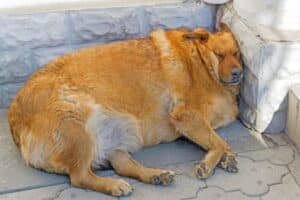
Learn to Prevent Dog Obesity with Proper Diet
- Importance of preventing dog obesity through proper diet and exercise.
- Understanding the definition and health risks of dog obesity.
- Factors contributing to dog obesity, balanced diet, portion sizes, exercise, and seeking veterinary guidance.
As responsible pet owners, ensuring the well-being of our canine companions is paramount. One of the most crucial aspects of maintaining a dog’s health is preventing obesity through a proper diet. In this comprehensive guide, we’ll delve into the significance of preventing dog obesity with a proper diet, share eye-opening statistics, and underscore the importance of a balanced diet and regular exercise in achieving this goal.
Hook: The Importance of Preventing Dog Obesity with Proper Diet
Preventing dog obesity with a proper diet is not just about appearance; it’s about safeguarding your pet’s overall health and vitality. By understanding the impact of diet and exercise on your dog’s well-being, you can take proactive steps to prevent obesity and its associated health risks.
Statistics on Dog Obesity
According to recent studies, over 56% of dogs in the United States are classified as overweight or obese. This prevalence of obesity significantly predisposes dogs to various health issues, including diabetes, joint problems, and a reduced lifespan.
Importance of Prevention
Preventing obesity in dogs with a proper diet is crucial for ensuring their longevity and quality of life. By focusing on a balanced diet and regular exercise, pet owners can actively contribute to their dogs’ overall health and well-being.

Understanding Dog Obesity
Understanding the implications of dog obesity is fundamental to addressing this issue effectively.
Definition of Dog Obesity
Dog obesity refers to an excess of body fat that negatively impacts a dog’s health and well-being. It is generally assessed based on a dog’s body condition score and can lead to a myriad of health complications.
Health Risks Associated with Dog Obesity
Obesity in dogs can lead to a range of health issues such as diabetes, orthopedic problems, cardiovascular disease, and a decreased immune function, significantly impacting their quality of life.
Impact on Longevity
Studies have shown that obese dogs have a shorter lifespan compared to their healthy-weight counterparts. Preventing obesity through proper diet and exercise can significantly enhance a dog’s overall longevity and vitality.
Factors Contributing to Dog Obesity
Understanding the root causes of dog obesity is crucial in formulating effective preventive measures.
Overfeeding
Overfeeding, including excessive treats and table scraps, is a leading contributor to dog obesity. The practice of offering food as a display of affection can lead to unintended weight gain.
Lack of Exercise
A sedentary lifestyle and insufficient physical activity can lead to weight gain in dogs, emphasizing the significance of regular exercise in preventing obesity.
Genetic Predisposition
Certain dog breeds are genetically predisposed to obesity, making it important for pet owners to be mindful of their dog’s individual risk factors.

Importance of a Balanced Diet
A balanced diet is the cornerstone of preventing obesity and promoting overall health in dogs.
Nutritional Requirements
Dogs require a balanced blend of proteins, fats, carbohydrates, vitamins, and minerals to maintain optimal health and weight. Understanding these nutritional requirements is crucial in preventing obesity.
Health Implications of a Balanced Diet
A well-rounded diet not only supports weight management but also contributes to a dog’s energy levels, coat condition, and overall well-being.
| Factors to Consider | Nutritional Requirements |
|---|---|
| Dog’s age | Balanced blend of proteins, fats, carbohydrates, vitamins, and minerals |
| Size | |
| Breed | |
| Activity level |
Identifying Proper Portion Sizes
Determining appropriate portion sizes is essential for preventing overfeeding and subsequent weight gain in dogs.
Factors to Consider
Factors such as a dog’s age, size, breed, and activity level should be taken into account when determining portion sizes to prevent overfeeding.
Measuring Techniques
Utilizing standardized measuring cups and adjusting portion sizes based on a dog’s individual needs can help prevent overeating and obesity.
Selecting the Right Dog Food
Choosing the right type of dog food plays a pivotal role in preventing obesity and promoting overall health.
Evaluation of Dog Food Types
Comparing and contrasting dry kibble, wet food, and raw diets can help pet owners make informed decisions regarding their dog’s diet and weight management.
Quality and Ingredients
Opting for high-quality, nutritious ingredients in dog food is essential for preventing obesity and supporting a dog’s overall health and vitality.
For more information on selecting healthy dog food, you can refer to our healthy dog food buying guide.

Incorporating Regular Exercise
Regular physical activity is a crucial component of preventing obesity and maintaining a healthy weight in dogs.
Exercise Requirements
Dogs have varying exercise requirements based on their breed, size, and age, emphasizing the need for tailored exercise routines to prevent obesity.
Suitable Activities
Engaging in activities such as walking, running, hiking, and interactive play can help dogs maintain a healthy weight and lead an active lifestyle.
For more information on the importance of regular dog exercise, you can refer to our guide on the importance of regular dog exercise.
Monitoring and Managing Body Condition
Regular monitoring and management of a dog’s body condition are essential for preventing obesity.
Body Condition Score
Understanding how to assess a dog’s body condition and recognizing signs of obesity is crucial for effective prevention and management.
Healthy Weight Management
Implementing strategies such as regular weigh-ins and adjustments to diet and exercise can help maintain a dog’s healthy body weight.

Healthy Treat Options
Offering nutritious and low-calorie treats in moderation is key to preventing obesity while still indulging your dog.
Nutritious Treats
Nutrient-rich treats such as carrot sticks, blueberries, and lean meats can complement a dog’s diet without contributing to obesity.
Moderation
Practicing moderation and using treats as occasional rewards can prevent excessive calorie intake and weight gain.

Seeking Veterinary Guidance
Consulting with a veterinarian is crucial in formulating a personalized diet and exercise plan for preventing obesity in dogs.
Professional Advice
Veterinarians can provide tailored recommendations to address a dog’s individual needs and prevent obesity effectively.
Weight Management Programs
Veterinary weight management programs offer specialized support and guidance for pet owners with obese dogs, focusing on achieving and maintaining a healthy weight.
Breed-Specific Needs and Considerations
Understanding the unique dietary and exercise requirements of different dog breeds is essential in preventing obesity.
Breed Variations
Different dog breeds may have specific predispositions and requirements, necessitating tailored approaches to prevent obesity effectively.
Tailored Approaches
Customizing diet and exercise plans based on breed characteristics can significantly contribute to preventing obesity and promoting overall health.
Addressing Behavioral Factors
Behavioral considerations play a crucial role in preventing overeating and obesity in dogs.
Food-Related Anxiety
Addressing food-related anxiety and behavioral issues is essential in preventing overeating and weight gain in dogs.
Training and Strategies
Implementing training and behavior modification strategies can help address food-related issues and support weight management.
Conclusion
Preventing dog obesity through proper diet and exercise is a proactive approach to safeguarding a dog’s health and vitality. By staying informed and taking practical steps, pet owners can contribute to their dog’s overall well-being and longevity.
Recap
Real-Life Example: Making Lifestyle Changes for My Labrador
Meet Sarah and Max
Sarah, a devoted dog owner, noticed that her Labrador, Max, was starting to gain weight as he entered his senior years. Concerned about his health, she decided to make lifestyle changes to prevent obesity and improve Max’s overall well-being.
Taking Action
Sarah began by reassessing Max’s diet, consulting with a veterinarian to determine the appropriate portion sizes and nutritional requirements for a senior Labrador. She also incorporated regular exercise into Max’s routine, including daily walks and interactive play sessions to keep him active.
Results and Impact
By following a balanced diet and exercise plan tailored to Max’s needs, Sarah observed gradual but significant weight loss in Max. Not only did Max shed the excess pounds, but he also displayed increased energy levels and overall vitality.
Key Takeaway
Sarah’s experience with Max exemplifies the impact of proactive measures in preventing dog obesity. Through a combination of a balanced diet, regular exercise, and attentive monitoring, she successfully managed Max’s weight and enhanced his quality of life as he aged.
Understanding the impact of obesity, the importance of a balanced diet, regular exercise, and seeking professional guidance are key in preventing dog obesity.
Call to Action
Take proactive steps in managing your dog’s weight and overall health by implementing the guidance provided in this comprehensive guide.
Amanda Smith, DVM, is a licensed veterinarian with over 10 years of experience in small animal medicine and nutrition. Dr. Smith graduated from the University of Veterinary Medicine with a focus on clinical nutrition and obesity in companion animals. She has conducted research on the impact of diet on canine obesity, and her work has been published in several peer-reviewed journals, including the Journal of Veterinary Medicine and Animal Nutrition. Dr. Smith has also been involved in weight management programs for dogs, working closely with pet owners to develop tailored diet and exercise plans to prevent and manage obesity. Her expertise in identifying proper portion sizes, selecting the right dog food, and incorporating regular exercise makes her a trusted authority in the field. Dr. Smith is dedicated to educating pet owners on the importance of a balanced diet and healthy weight management for their canine companions.
Facebook
Pinterest
Twitter
LinkedIn

